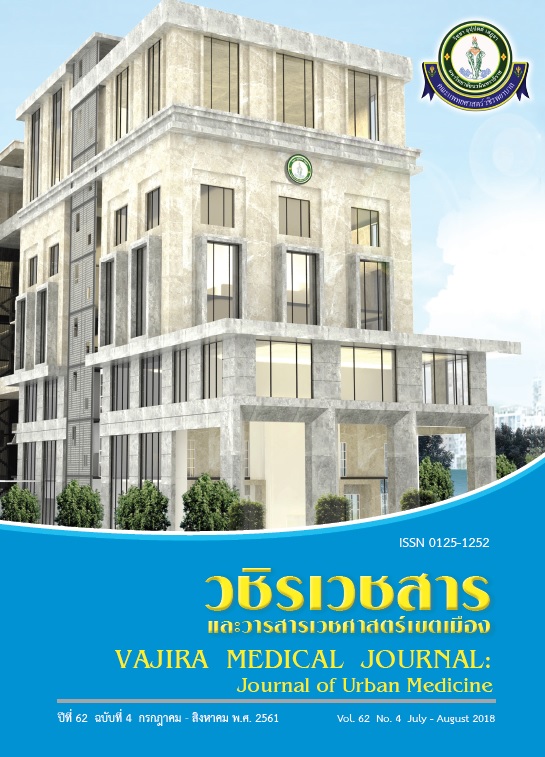Stress and Socio-demographic Factors Related to Empathy among Medical Students in Faculty of Medicine Vajira Hospital
Main Article Content
Abstract
Objective: To study empathy score, stress and socio-demographic factors related to empathy among medical students
Methods: Descriptive cross - sectional study was conducted among 255 first to sixth year medical students at the Faculty of Medicine, Vajira Hospital. The instruments were composed of socio-demographic factors questionnaires, Perceived Stress Scale-10 (PSS-10) and Jefferson Scale of Physician Empathy-Student Version (JSPE-S) in Thai language. Statistical analysis included descriptive analysis, unpaired t-test, Mann-Whitney test, ANOVA, Kruskal- Wallis test, Pearson’s correlation, Spearman’s rank correlation, Point-biserial correlation, Eta correlation and multiple linear regression.
Results: The participants were 255 medical students, male 51.4% and female 48.6%. The mean empathy scores measured by JSPE-S Thai version was 107.80 (S.D.=12.4). The mean of PSS-10 Thai version score was 15.1 (S.D.=5.9). There were no statistically significant differences in empathy scores between subgroup of socio-demographic factors and level of stress. The results indicated that factors that had significant positive correlation with empathy scores were current department study (r = 0.149), students’ socioeconomic status (r = 0.132), effective medical role models (r = 0.005), personal counselors (r = 0.0.005) and stress (r = 0.141). In the regression model, higher socioeconomic status (β = 0.645, p = 0.037), students’ mental problems (β = -0.281, p = 0.027) as well as stressors (β = 0.186, p = 0.038) had an effect on empathy score.
Conclusion: Medical education should emphasize the importance of medical role model, teach how to live a sufficiency economy, and prevent mental health problem in order to enhance the level of empathy in medical students
Downloads
Article Details
References
2. Hojat M, Mangione S, Nasca TJ, Cohen MJ, Gonnella JS, Erdmann JB, et al. The Jefferson scale of physician empathy: development and preliminary psychometric data. Educ Psychol Meas 2001;61:349-65.
3. Hirsch E. The Role of Empathy in Medicine: a medical student's perspective [Internet]. 2007 [cited 2017 Sep 8]. Available from: http:// journalofethics.ama-assn.org/2007/06/medu1-0706.html.
4. Peabody FW. Landmark article March 19, 1927: the care of the patient. by Francis W. Peabody. JAMA 1984;252(6):813–8.
5. Jumroonrojana K, Zartrungpak S. Development of the Jefferson scale of physician empathystudent version (Thai version). J Psychiatr Assoc Thailand 2012;57(2):213-24.
6. Association of American Medical Colleges (AAMC) Medical School Objectives Project. [cited 2-17 Sep 8]. Available from: http://www.aamc.org/meded/msop.
7. Neumann M, Edelhäuser F, Tauschel D, Fischer M, Wirtz M, Woopen C, et al. Empathy decline and its reasons: a systematic review of studies with medical students and residents. Acad Med 2011;86(8):996-1009.
8. Rayakeaw R, Satayasai W. 4-6th year medical students’stress: case study at medical center, Buddhachinaraj hospital, Phitsanulok. Thammasat Medical Journal 2013;13:17-23.
9. Apiwatanasiri C, Somaketrarin K, Suraprayoon K, Leurmprasert K , Wankaew N, Homchampa P, et al. Stress and coping in medical students at clinical level, Khon Kaen university. Srinagarind Med J 2007;22(4):416-24.
10. Omigbodun O, Odukogbe A, Omigbodun A, Yusuf O, Bella T, Olayemi O. Stressors and psychological symptoms in students of medicine and allied health professions in Nigeria. Psychiatry Epidemiol 2006;41:415-21.
11. Baird AD, Scheffer IE, Wilson SJ. Mirror neuron system involvement in empathy: a critical look at the evidence. Soc Neurosci 2011;6(4):327-35.
12. Park KH, Kim D, Kim SK, Yi YH, Jeong JH, Chae J, et al. The relationships between empathy, stress and social support among medical students. Int J Med Educ 2015;6:103-8.
13. Rojanasakul U, Jumroonrojana K, Saipanish R. Study of changes in medical students’ empathy to patients before and after the first clinical year in Ramathibodi hospital. J Psychiatr Assoc Thailand 2014; 59(1):63-72.
14. Austin EJ1, Evans P, Magnus B, O'Hanlon K. A preliminary study of empathy, emotional intelligence and examination performance in MBChB students. Med Educ 2007;41(7):684-9.
15. Hasan S, Al-Sharqawi N, Dashti F, AbdulAziz M, Abdullah A, Shukkur M, et al. Level of empathy among medical students in Kuwait university, Kuwait. Med Princ Pract 2013;22:385–9.
16. Chen DC, Kirshenbaum DS, Yan J, Kirshenbaum E, Aseltine RH. Characterizing changes in student empathy throughout medical school. Med Teach 2012;34(4):305-11.
17. Chen D, Lew R, Hershman W, Orlander J. A crosssectional measurement of medical student empathy. J Gen Intern Med 2007;22(10):1434–8.
18. Ozcakir A, Ed iz B, Bilgel N. The relationship between subjective well-being and empathy among Turkish medical students [Internet]. 2016 [cited 2017 Sep 8]. Available from: https://doi.org/10.15694/mep.2016.000059.
19. Quince T, Thiemann P, Benson J, Hyde S. Undergraduate medical students’ empathy: current perspectives. Adv Med Educ Pract 2016;7:443-55.
20. Green SB. How many subject does it take to do a regression analysis? Multivariate Behav Res 1991;26;499-510.
21. Hojat M, Gonnella JS, Nasca TJ, Mangione S, Veloksi JJ, Magee M. The Jefferson scale of physician empathy: further psychometric data differences by gender and specialty at item level. Acad Med 2002;77(suppl):s58–60.
22. Wongpakaran N, Wongpakaran T. The Thai version of the PSS-10: an investigation of its psychometric properties. Biopsychosoc Med 2010;4:6.
23. Afghani B, Besimanto S, Amin A, Shapiro J. Medical students' perspectives on clinical empathy training. Educ Health 2011;24(1):544.
24. Kataoka HU, Koide N, Ochi K, Hojat M, Gonnella JS. Measurement of Empathy among Japanese medical students: psychometrics and score differences by gender and level of medical education. Acad Med 2009; 84:1192-7.
25. Rahimi-Madiseh M, Tavakol M, Dennick R, Nasiri J. Empathy in Iranian medical students: A preliminary psychometric analysis and differences by gender and year of medical school. Med Teach 2010; 32:e471-8.
26. Coulehan J. Written role models in professionalism education. Med Humanit. 2007 Dec;33(2):106-9.
27. Kirby H. The Relationship between Level of Empathy and Stress Contagion; thesis. Missoula: University of Montana; 2008.


